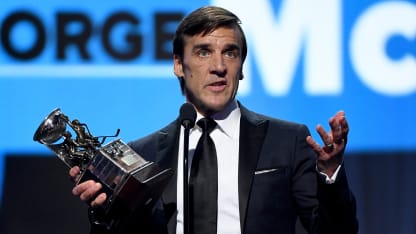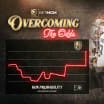During this pause in the NHL season, VGK Insider Gary Lawless took the opportunity to sit down with Golden Knights President of Hockey Operations George McPhee. The two discuss how McPhee and the organization are handling this unique circumstance, and also take a trip down memory lane to look back at McPhee's career.
Below is a transcription of part of the interview.
To listen to the entire interview, please click here
.
Chat with George McPhee
Gary Lawless sits down with VGK President of Hockey Ops George McPhee

© Ethan Miller/Getty Images
VGK Insider Gary Lawless: From a guy that played in the NHL, and has been a general manager in the League for more than 20 years, is this the most extraordinary set of circumstances you've ever seen?
VGK President of Hockey Operations George McPhee:Yeah, yeah it would be. We've all been through different crises before, whether its 9/11 or the economic crisis of 2008. In year one we went through October 1, but obviously this is global. It's a global health crisis and it's also now a global economic crisis. Confident that we'll find our way through, but the next few weeks are going to be difficult I think.
Lawless:What is it like to have a team that is a contender for the Stanley Cup, suddenly pause with no understanding of when play may resume again?
McPhee: I think that when this first happened, we were all wondering how quickly we could get back to work and what this means. It felt really strange to suddenly not be playing, not be practicing and not be getting ready for the next game. That has all now taken a back seat, needless to say, to this health crisis we have. We will stay in the back seat until we get this crisis taken care of. We have to come out of the other side of this crisis, and then we can get focused on hockey again. We sure miss it. I don't think any of us ever take the game for granted. We are very fortunate to be part of it. I feel very, very fortunate to be part of management now and for all these years. To be in the middle of a practice and in the middle of a game, there is nothing like it. I enjoy watching practices. I enjoy watching great athletes and coaches work at practice, doing the things they do and working on their execution and talents. To be in the middle of a game at this level and be part of a team is really something to experience. When it all disappears as quickly as it did, it really takes some kind of adjustment. The first two or three days of this, you're thinking we can get through this, but now you're on day 10 or 14 and it's not easy.
Lawless: What are your thoughts on missing the little moments that come from practices or during games?
McPhee: What we all learn when you're at this level is that it is life consuming, sometimes at a great personal cost. This business can be hard on your family. You sort of become cloistered; this is all you know and this is all you do. Every once in a while you can escape with a good book or something, but not for long. No one is telling us that we have to do this. We're doing it because we really, really enjoy it. I love the challenge that hockey presents. It's a constant and endless education. We're learning all the time. You just mentioned, you sit there and watch practice and look at line combinations. When you're in management, you're looking at everything. How is the coach coaching? What are the drills like? Are they the right drills for this team? How are certain players doing? Is someone trying to get through practice that is injured? Can he really play tomorrow night or not? All of the different things that you process. In management, you're thinking where are the weaknesses and where can we improve. It's consuming because you allow it to be, but it has to be if you want to be good at this level. I sure miss that and hope we get back to it soon. It really is a privilege to be able to do it.
Lawless: I have tried to look at this and I try to be a positive person and always look at when you're hit with a negative, where's the positive from this? Right now, my little girl is down the hall. My nine-year-old daughter is doing her virtual learning. My wife is doing a virtual workout with her friends at her gym. So, we're together. Like last night, we were all staring at each other and my daughter was dragging a little bit and I said, you know, I could be on the road.
McPhee: It didn't take much.
Lawless: She kind of grasped, oh the old man is around. So we sat down and decided we were going to watch Downton Abbey as a family, so I'm making my sacrifices, George.
McPhee: We certainly have lots to be thankful for. There are some people out there that are really struggling and it's going to take a while for them to get back on their feet. I think we're all trying to make the best use of our time with our families and I feel lucky and blessed that my whole family is here. We're enjoying every day with one another, but we're mindful that other people are struggling here. And Vegas is getting hit really hard economically, maybe more than any city in this country. This economy and this town is based on hospitality, so a lot of people in this town are really struggling.
Lawless:The business doesn't grind to a halt. It keeps moving. How are you spending your days right now and how is all of our hockey operations crew? What are they up to right now?
McPhee: There are lots of things you can do. Certainly, review how things have gone, revisit your blueprint. Have you stuck to your blueprint? We're in year three and I really like the way things have been going for our club. We started the season a little slow. We had three players that were injured. The hidden injuries, we had three guys that were hurt late in the summer in training and missed a lot of training time. They were really behind when we got going. It was pretty obvious. But we stuck to our blueprint. We made a good trade for Chandler Stephenson. Again, the right kind of fit for us. A guy looking for an opportunity, a second chance and he's come here and played really well. Nicolas Roy has come in and played very, very well for us. Cody Glass played well for us. You take a look at that and say, "Are we making the right decisions and how are we doing?" You know, we had to make a difficult coaching change, but it's going the way that we had hoped. You review all of those decisions and I certainly like what we did, and I certainly like what we did at the trade deadline. We addressed needs and did it well. Those are the types of things you can do. We've looked at the team, we've talked to our amateur staff, we've talked to the pro staff. We've tried to work on some things with respect to our American League team, what that might look like next year, we've signed Zach Whitecloud. There's never a shortage of work in this business. Right now, we're able to do it at a pace that's a little more reasonable than usual, so those are the things you do.
Lawless: I think it's Lou Lamoriello's saying, and maybe he borrowed it from somebody else, but he said when it comes to making decisions or doing anything in business, if you have time, you use it. This is an opportunity to get ahead. Year one, you went to the Stanley Cup Final and woke up the day after you'd been eliminated and it was like, okay the draft is in two weeks and free agency is in three weeks. We've got work to do. So now you have a little bit of track ahead of you.
McPhee: And like most people, you're looking for an edge. What can we do to get that edge to be a better organization coming out of this? That's what you look to do whenever you stop playing. It's basically next year starts tomorrow. Let's get going. This is no different. I think people take a little bit of a break but then you get going again. I personally get up in the morning, try to get some exercise and then the next three to four hours are totally dedicated to the organization and then mid to late afternoon it's more about family time.
Lawless: You mentioned making a coaching change. I've seen you go through trades and seen how hard it is for you to - it's got to be authentic. You can't be fake in this business. If you're going to care for the players, they have to be able to see that and it has to be important and it has to be real. I know with you it is. It must be, and I know you've made coaching changes along the way, it can't be an easy thing to do.
McPhee: It never is. This is a difficult business. We're all in it because we enjoy it, it's a fun business, but it can be really challenging, and you meet some terrific people and every once in a while, you have to move along and make changes. We've always said the organization comes first; the individual come a close second. When you're in management, you have to make tough decisions and you have a front office that has to guts to make them, to make those difficult decisions. I think to a lot of people the coaching change was really unexpected. It caught a lot of people off guard. We had our reasons for doing it. It wasn't easy to do, but we made that decision and we like the way the team is playing now. If you're running the organization the right way, you can't look the other way on things. If you see something that needs to be addressed, you have to confront it head on and address it. We did that and then you get to other decisions. Trading Cody Eakin wasn't easy. He's a real quality guy. I've known him a long time, Kelly (McCrimmon) has known him a long time. Kelly knows him from Winnipeg, I know him from drafting him in Washington and can't believe that I've traded him twice. He's a good player, but sometimes you have to look at the organization as a whole and figure out what you have to do. The salary cap is a real factor in that. It requires that you make trades from time to time if you're a good team and you've got good players pushing to come in your lineup, not only for them but with the cap as well. That means that you have to trade some players that are a little older, making a little more money, but it doesn't mean that you don't love the players. It's hard to move some of these guys.
Click here to hear the rest of the interview.


















